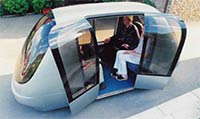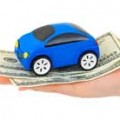In any futuristic movie you watch, the lead character “drives” around in an autonomous vehicle. Without having to worry about actually driving the car or getting stuck in traffic, the character has time to figure out how to diffuse the bomb and save the girl. Roll credits.
All of these films predicted that we (society) would have a self-driving vehicle within the first 100 years of the 21st century—and they were right. The Institute of Electrical and Electronics Engineers (IEEE) has predicted that by 2040, at least 75 percent of all vehicles on the road will be self-driving. Like Tom Cruise in Minority Report, we’re going to be going hands-free.
When Are Driverless Cars Going to Be Available?
When can we expect this shift to happen to driverless cars to occur? Well, Audi has promised that in 2017, the Next Generation Audi A8 will be fully capable of autonomous driving—that is literally next year! For those of us with a spotty driving record and issues with parallel parking, this is pretty awesome news. And for those of us on a budget, other (and more affordable) autonomous vehicles will enter the market by 2020.
So what does this mean for the auto insurance industry? Will premiums rise, drop or be caput? How does this change the myriad auto insurance online quote comparison services out there? Will certain coverage cease altogether while others pivot with the times?
If human error is not the cause of an accident, who is to blame and who is responsible for the damages?
Is It the End of the Auto Insurance Industry?
Luxury vehicles and select mid-priced cars already come equipped with some automated features including: automated parallel parking, lane-departure warnings, blind-spot monitoring, and forward-collision warnings. According to the Insurance Information Institute, (III) these automated features have already led to a lower fatality rate. Forbes Magazine concludes that because traffic accidents will decline (and as we’ve learned, they’re on the decline already) and because liability will transfer from the motorist to the automaker and their software, insurance rates are going to fall fast. Bloomberg estimates that insurance premiums will drop by 60 percent over a 15-year period.
To prepare for this, insurance agencies like State Farm have begun to recalibrate their insurance services. Forbes reports that State Farm is pushing for a rebranding of itself as “a life management company,” specializing in energy use, environmental conditions and security systems.
But is this enough? Are insurance giants like State Farm, Allstate and Progressive prepared to downsize? Allstate is a company that already specializes in insuring auto security systems, keeping track of client speed and braking through an attachment in the vehicle. But if the auto manufacturer and software company takes charge of that, what can Allstate do? Allstate’s Chief Executive Officer, Tom Wilson, has a plan. While he doesn’t get too specific in an interview with Bloomberg, he does share that the company has a group studying what they have termed the “connected car.” Instead of just simply insuring the vehicle (now that that will be taken out of their hands in the next decade) Allstate is looking into providing coverage for other types of smart devices, like the cell phone. The company is also considering providing their customers access to their driving data and offering them coupons if they drive past a certain restaurant or other such entity.
Driverless Cars and Their Impending Collision with the Auto Insurance Industry – Final Thoughts
So far, all of the other insurance companies are keeping quiet about their plans for the future. III points out that even though the number of crashes is expected to drop significantly once automated cars come to market, that doesn’t mean repair costs are going to drop. Issues skeptics take with the automated vehicle is its reliance on the software. What if the driver does get in a crash and it fries the car’s computer? How much will that cost to replace? Will thieves be able to hack into the system and steal private data? Will hackers be able to take control of a moving automated vehicle? These are all fair points. We’ll just have to wait and see.









I’ve heard a couple different predictions on this topic. I have heard that rates will drop for those with driverless cars, but will skyrocket for those who still drive.
As you say, time will tell & the “cybersecurity” for lack of a better term of the automated system will also need to be hacker-proof to have lower rates. And….only time will tell.
Josh recently posted…A Man’s Review of Nely Galan’s “Self Made”
Good point Josh – I suspect that I’ll be driving a manual car for a while until the driver-less cars hit the used market. So, hopefully my rates don’t go through the roof :-)!